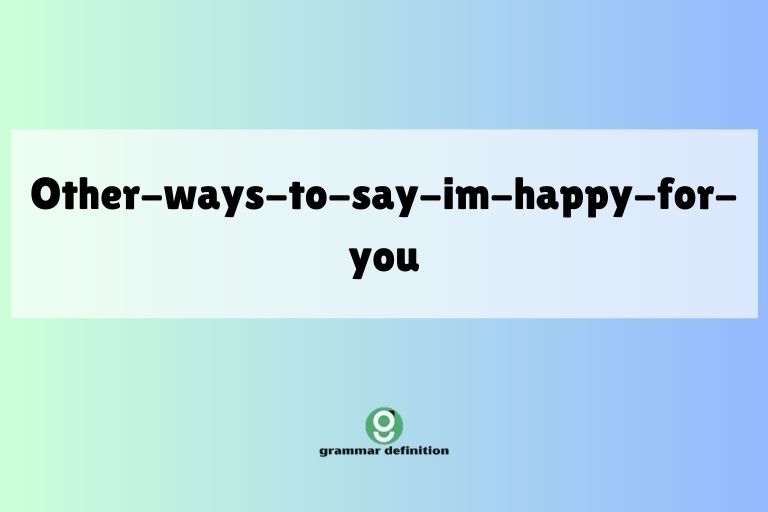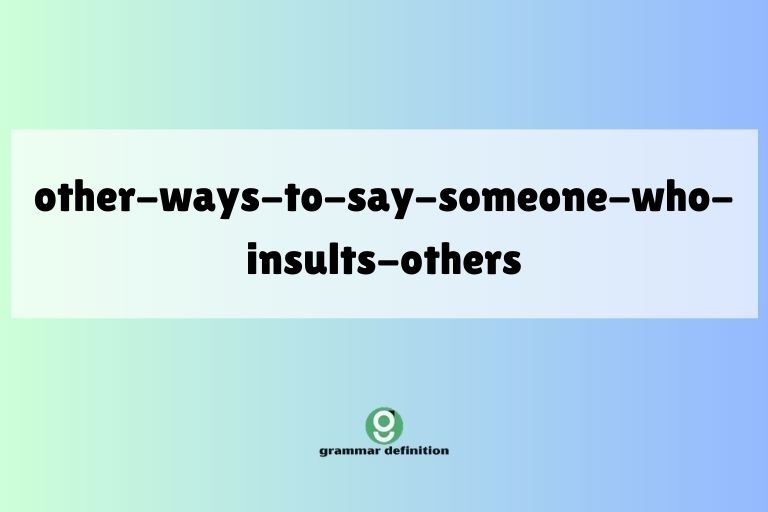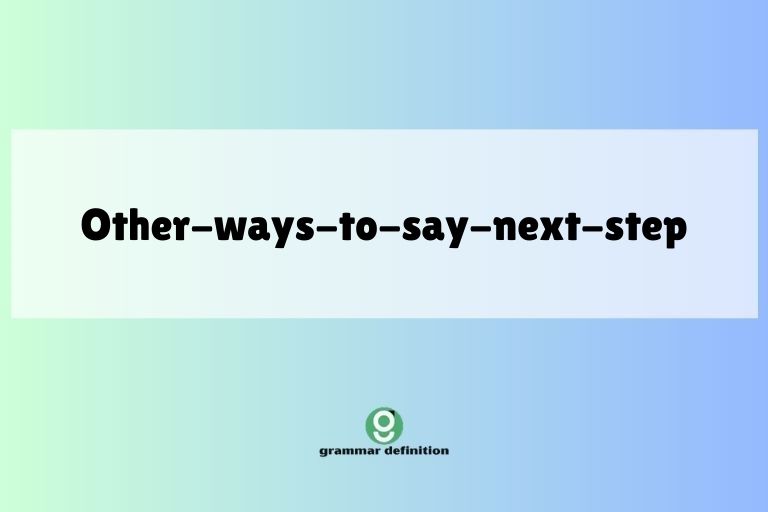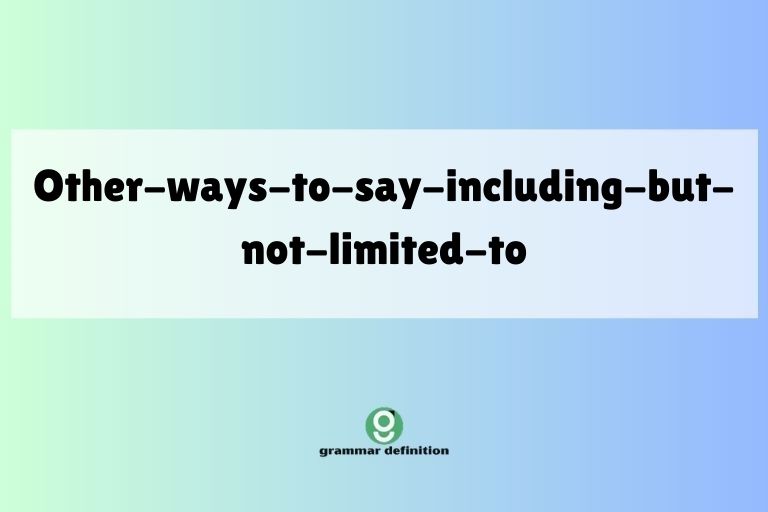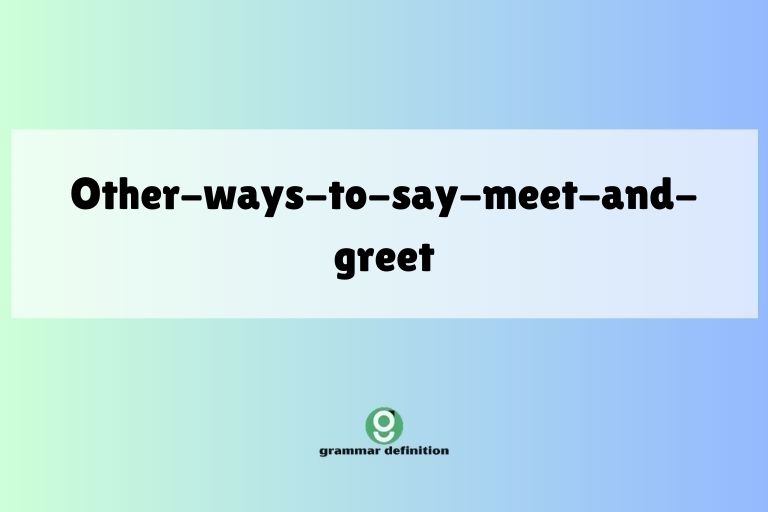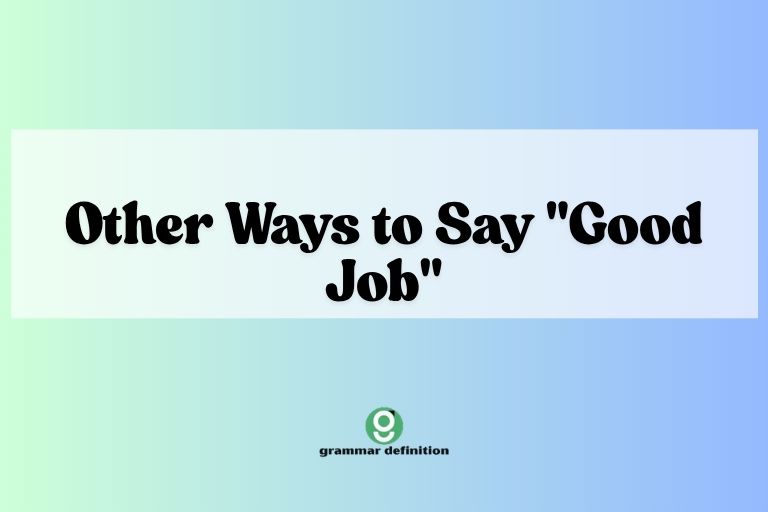Beyond “I’m Thirsty”: Expanding Your English Vocabulary
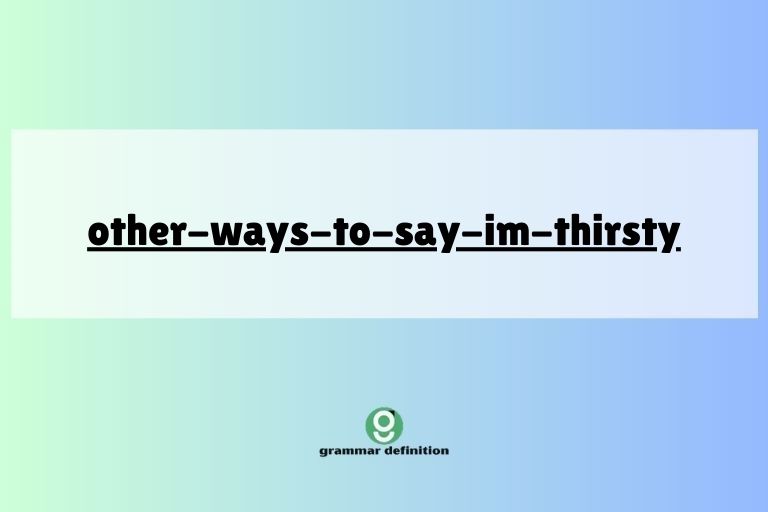
Expressing thirst might seem simple, but English offers a rich variety of ways to convey this basic human need. Mastering these alternative expressions not only enhances your vocabulary but also allows you to communicate more precisely and engagingly in different social contexts.
This article explores numerous ways to say “I’m thirsty,” delving into their nuances, usage rules, and common pitfalls. Whether you’re a beginner or an advanced learner, understanding these expressions will significantly improve your fluency and confidence in English.
This guide is structured to provide a comprehensive overview of thirst-related vocabulary. We’ll start with a definition and classification of different expressions, then move on to structural breakdowns, usage examples, and common mistakes.
Practice exercises are included to reinforce your learning, and an FAQ section addresses common questions. By the end of this article, you’ll be well-equipped to express your thirst in a variety of sophisticated and natural ways.
Table of Contents
- Definition and Classification
- Structural Breakdown
- Types and Categories of Expressions
- Examples
- Usage Rules
- Common Mistakes
- Practice Exercises
- Advanced Topics
- FAQ
- Conclusion
Definition and Classification
Thirst, at its core, is the sensation of needing to drink. It’s a fundamental physiological drive that prompts us to seek out liquids.
In English, the expression “I’m thirsty” is the most direct and common way to communicate this feeling. However, language offers many alternative ways to express the same idea, each with its own subtle connotations and levels of formality.
Classifying these expressions can be helpful for understanding their appropriate usage. We can categorize them based on:
- Formality: Formal, informal, or neutral.
- Figurative Language: Literal or figurative (using metaphors or similes).
- Intensity: Mild, moderate, or strong thirst.
Understanding these classifications helps you choose the most appropriate expression for a given situation and audience. For instance, you might use a formal expression in a business setting but a more informal one with friends.
Structural Breakdown
The basic structure for expressing thirst in English typically involves a subject (“I”), a verb (often a linking verb like “am” or “feel”), and an adjective or phrase describing the sensation of thirst. However, variations exist, including using verbs that imply needing or wanting something to drink.
Here are some common structural patterns:
- Subject + Linking Verb + Adjective: I am thirsty. I feel parched.
- Subject + Verb of Need + Noun: I need a drink. I crave some water.
- Subject + Verb of Want + Noun: I want something to drink. I’d like a glass of water.
- Impersonal Construction: A drink would be nice. Some water sounds good.
These structures can be modified with adverbs to indicate the intensity of thirst (e.g., I’m really thirsty) or with qualifying phrases to specify the desired drink (e.g., I’m thirsty for some lemonade).
Types and Categories of Expressions
Exploring the different types of expressions allows for a deeper understanding of the nuances involved in communicating thirst. Here’s a breakdown of common categories:
Literal Expressions
Literal expressions are direct and straightforward statements about being thirsty. They use simple vocabulary and avoid figurative language.
These expressions are generally appropriate in most situations.
Examples include:
- I’m thirsty.
- I need a drink.
- I want something to drink.
- I could use some water.
Figurative Expressions
Figurative expressions use metaphors, similes, or other figures of speech to convey the feeling of thirst in a more colorful or evocative way. These expressions can add emphasis or humor to your communication.
Examples include:
- My throat is dry as a bone.
- I’m parched.
- I’m as dry as the Sahara Desert.
- My mouth feels like cotton.
Informal Expressions
Informal expressions are typically used in casual settings with friends, family, or close acquaintances. They often involve slang or colloquialisms and may not be appropriate in formal situations.
Examples include:
- I’m gasping for a drink.
- I’m dying for some water. (Hyperbole)
- I could murder a drink. (Hyperbole)
- My throat’s killing me.
Formal Expressions
Formal expressions are used in professional or official settings where politeness and respect are paramount. They typically avoid slang and use more precise vocabulary.
Examples include:
- I would appreciate a glass of water.
- I am feeling rather dehydrated.
- If you don’t mind, I’d like something to drink.
- I am in need of some refreshment.
Examples
Here are several tables containing a variety of ways to say “I’m thirsty,” categorized by formality, intensity, and figurative language, along with example sentences. Understanding these different categories will help you choose the most appropriate expression for any given situation.
Table 1: Common Expressions of Thirst
This table presents a range of common ways to express thirst, from basic statements to slightly more descriptive phrases. These are generally suitable for everyday conversations.
| Expression | Example Sentence |
|---|---|
| I’m thirsty. | I’m thirsty; can I have some water? |
| I need a drink. | I need a drink after that workout. |
| I want something to drink. | I want something to drink, preferably iced tea. |
| I could use a drink. | I could use a drink after all this talking. |
| I’d like something to drink. | I’d like something to drink, please. |
| I’m feeling a bit thirsty. | I’m feeling a bit thirsty after walking in the sun. |
| I’m rather thirsty. | I’m rather thirsty; is there any juice? |
| I’m getting thirsty. | I’m getting thirsty; let’s stop for a drink. |
| My throat is dry. | My throat is dry; I need some water. |
| I feel like I need some water. | I feel like I need some water after eating that spicy food. |
| I’m dry. | I’m dry; do you have any soda? |
| I feel dehydrated. | I feel dehydrated after running the marathon. |
| I could go for a drink. | I could go for a drink right about now. |
| I’m ready for a drink. | I’m ready for a drink; the presentation is finally over. |
| I’m craving a drink. | I’m craving a drink, maybe something cold and fizzy. |
| I have a thirst. | I have a thirst that only lemonade can quench. |
| I’d love a drink. | I’d love a drink; thank you for offering. |
| I’m longing for a drink. | I’m longing for a drink after this long drive. |
| I require a drink. | I require a drink to continue this task. |
| I’m parched. | I’m parched; please, some water! |
| I’m gasping for a drink. | I’m gasping for a drink after that intense workout. |
| I’m dying for some water. | I’m dying for some water; this heat is unbearable. |
| My throat’s killing me. | My throat’s killing me; I need something to soothe it. |
| I’m bone dry. | I’m bone dry; is there any juice available? |
Table 2: Figurative Expressions of Thirst
This table showcases more creative and descriptive expressions that use figurative language to emphasize the feeling of thirst. These are best used when you want to add flair to your speech or writing.
| Expression | Example Sentence |
|---|---|
| My throat is as dry as a bone. | My throat is as dry as a bone from all that shouting. |
| I’m as dry as the Sahara Desert. | I’m as dry as the Sahara Desert; I need a gallon of water. |
| My mouth feels like cotton. | My mouth feels like cotton; I can barely swallow. |
| I’m drier than a desert. | I’m drier than a desert after that hike. |
| I feel like I’ve been walking through the desert. | I feel like I’ve been walking through the desert; I’m so thirsty. |
| I could drink an ocean. | I could drink an ocean; I’m so incredibly thirsty. |
| I’m so thirsty I could drink a horse. | I’m so thirsty I could drink a horse; please get me something. |
| I feel like my tongue is glued to the roof of my mouth. | I feel like my tongue is glued to the roof of my mouth; I need water immediately. |
| I’m so thirsty, I feel like a plant that hasn’t been watered in weeks. | I’m so thirsty, I feel like a plant that hasn’t been watered in weeks; can someone help me? |
| I’m wilting from thirst. | I’m wilting from thirst; this summer heat is brutal. |
| My lips are cracking from thirst. | My lips are cracking from thirst; I need hydration. |
| My body is screaming for water. | My body is screaming for water after that intense workout. |
| I’m so thirsty, I feel like all the moisture has been sucked out of me. | I’m so thirsty, I feel like all the moisture has been sucked out of me; I must rehydrate. |
| I feel like a sponge that needs to be soaked. | I feel like a sponge that needs to be soaked; I’m desperate for a drink. |
| My throat feels like sandpaper. | My throat feels like sandpaper; I need something cool to drink. |
| I feel like I’ve swallowed a bag of cotton balls. | I feel like I’ve swallowed a bag of cotton balls; I need to drink something immediately. |
| My body is crying out for hydration. | My body is crying out for hydration after this long run. |
| I feel like I’m going to turn to dust. | I feel like I’m going to turn to dust if I don’t get some water soon. |
| I’m thirsting for a cold drink. | I’m thirsting for a cold drink on this hot summer day. |
| I’m craving a refreshing beverage. | I’m craving a refreshing beverage after working in the garden. |
| I feel like my insides are shriveling up. | I feel like my insides are shriveling up from thirst. |
| I’m so thirsty, I could drink the entire lake. | I’m so thirsty, I could drink the entire lake after hiking all day. |
| I’m thirstier than a camel in the desert. | I’m thirstier than a camel in the desert after this long journey. |
Table 3: Formal and Polite Expressions of Thirst
These expressions are suitable for professional settings or when you want to be particularly polite. They emphasize your request as a polite inquiry rather than a demand.
| Expression | Example Sentence |
|---|---|
| I would appreciate a glass of water. | I would appreciate a glass of water, if it’s not too much trouble. |
| If you don’t mind, I’d like something to drink. | If you don’t mind, I’d like something to drink; thank you for your hospitality. |
| I am in need of some refreshment. | I am in need of some refreshment after this long meeting. |
| Might I have a glass of water? | Might I have a glass of water, please? |
| Would it be possible to get a drink? | Would it be possible to get a drink? I’ve been talking for hours. |
| I am feeling rather dehydrated. | I am feeling rather dehydrated; is there any water available? |
| Excuse me, I was wondering if I could get something to drink. | Excuse me, I was wondering if I could get something to drink; I’m quite thirsty. |
| I’d be grateful for a glass of water. | I’d be grateful for a glass of water after this presentation. |
| If it’s convenient, I’d like a drink. | If it’s convenient, I’d like a drink; I don’t want to interrupt. |
| I was hoping I could get some water. | I was hoping I could get some water; I’ve lost my voice. |
| I’m hoping I could have a drink. | I’m hoping I could have a drink before the next session. |
| May I please have a glass of water? | May I please have a glass of water? Thank you very much. |
| I’m feeling a bit parched, if I may say so. | I’m feeling a bit parched, if I may say so; is there any water available? |
| If it’s not an imposition, I’d appreciate some water. | If it’s not an imposition, I’d appreciate some water; I’ve been traveling all day. |
| I would be most appreciative if I could have a drink. | I would be most appreciative if I could have a drink; thank you for your kind consideration. |
| I’m finding myself in need of some hydration. | I’m finding myself in need of some hydration after this long lecture. |
| I must say, I’m rather thirsty. | I must say, I’m rather thirsty; is there any chance of getting a drink? |
| I’m in dire need of some water, if you don’t mind. | I’m in dire need of some water, if you don’t mind; I’ve been talking non-stop. |
| I’m quite thirsty, if I may be so bold. | I’m quite thirsty, if I may be so bold; would it be possible to get a drink? |
| I am experiencing a significant need for water. | I am experiencing a significant need for water after this vigorous exercise. |
Table 4: Informal Expressions of Thirst
These expressions are suitable for casual conversations with friends and family. They often involve slang or hyperbole to emphasize the thirst.
| Expression | Example Sentence |
|---|---|
| I’m dying of thirst. | I’m dying of thirst; get me some water, quick! |
| I could murder a drink. | I could murder a drink after this workout. |
| I’m bone dry. | I’m bone dry; anyone got a soda? |
| I’m gasping for a drink. | I’m gasping for a drink; this heat is killing me. |
| My throat’s killing me. | My throat’s killing me; I need something cold. |
| I’m so thirsty, it’s not even funny. | I’m so thirsty, it’s not even funny; let’s get some juice. |
| I need a drink, stat! | I need a drink, stat! I’m about to pass out from thirst. |
| I’m so thirsty, I’d drink anything. | I’m so thirsty, I’d drink anything; even tap water sounds good. |
| Thirst is real. | Thirst is real; I need a large lemonade. |
| My tongue is sticking to the roof of my mouth. | My tongue is sticking to the roof of my mouth; I’m gasping. |
| I’m drier than the Mojave. | I’m drier than the Mojave; let’s get a drink. |
| I’m dehydrated AF. | I’m dehydrated AF; someone get me some water. |
| I’m so thirsty, I’m seeing mirages. | I’m so thirsty, I’m seeing mirages; please, water! |
| I’m about to wither away from thirst. | I’m about to wither away from thirst; seriously, a drink! |
| I’m craving something wet. | I’m craving something wet; a soda will do. |
| I could really go for a big gulp of water. | I could really go for a big gulp of water right now. |
| I’m ready to chug a whole bottle. | I’m ready to chug a whole bottle of water. |
| I’m so dry, I’m crunchy. | I’m so dry, I’m crunchy; need to rehydrate. |
| I gotta get some liquid in me. | I gotta get some liquid in me ASAP. |
| I’m desperate for hydration. | I’m desperate for hydration; please help me. |
Table 5: Expressions of Thirst with Specific Drink Preferences
These expressions combine the feeling of thirst with a specific craving for a particular type of drink. They are especially useful when you have a specific beverage in mind.
| Expression | Example Sentence |
|---|---|
| I’m thirsty for some lemonade. | I’m thirsty for some lemonade on this hot day. |
| I need a glass of iced tea. | I need a glass of iced tea to cool down. |
| I want some cold water. | I want some cold water after this run. |
| I could use a refreshing soda. | I could use a refreshing soda right now. |
| I’d like a cup of juice. | I’d like a cup of juice with my breakfast. |
| I’m craving a smoothie. | I’m craving a smoothie after the gym. |
| I’m in the mood for a milkshake. | I’m in the mood for a milkshake tonight. |
| I feel like drinking some coffee. | I feel like drinking some coffee to wake up. |
| I’m longing for a beer. | I’m longing for a beer after work. |
| I desire some wine. | I desire some wine with my dinner. |
| I’m thirsty for something fizzy. | I’m thirsty for something fizzy, like sparkling water. |
| I need a hydrating sports drink. | I need a hydrating sports drink after this game. |
| I want some coconut water. | I want some coconut water for electrolytes. |
| I could use a protein shake. | I could use a protein shake post-workout. |
| I’d like a herbal tea. | I’d like a herbal tea before bed. |
| I’m craving a hot chocolate. | I’m craving a hot chocolate on this cold night. |
| I’m in the mood for a fruit punch. | I’m in the mood for a fruit punch at the party. |
| I feel like drinking some green tea. | I feel like drinking some green tea for the antioxidants. |
| I’m longing for a cold brew. | I’m longing for a cold brew this morning. |
| I desire some sparkling cider. | I desire some sparkling cider for the celebration. |
Usage Rules
While many expressions for thirst are interchangeable, some have specific usage rules:
- Formality: Use formal expressions in professional settings and informal expressions with friends and family.
- Intensity: Choose expressions that accurately reflect the level of thirst. Avoid hyperbole (exaggeration) unless you intend to be humorous.
- Context: Consider the context of the conversation. Is it a casual chat or a serious discussion?
- Cultural Sensitivity: Be aware that some expressions may be more common or acceptable in certain cultures or regions than others.
For example, saying “I’m dying of thirst” might be acceptable among close friends but inappropriate in a business meeting. Similarly, using slang terms might confuse someone who is not a native English speaker.
Common Mistakes
Here are some common mistakes to avoid when expressing thirst in English:
- Incorrect Verb Tense: Saying “I was thirsty” when you are currently thirsty. The correct tense is “I am thirsty.”
- Misusing Figurative Language: Using a figurative expression that doesn’t make sense in the context. For example, saying “My throat is dry as a bone” when you’ve just finished drinking a glass of water.
- Inappropriate Formality: Using slang in a formal setting or being overly formal with close friends.
Here are some examples of correct and incorrect usage:
| Incorrect | Correct |
|---|---|
| I was thirsty (when you are currently thirsty). | I am thirsty. |
| My throat is dry as a bone, but I just drank a gallon of water. | My throat is dry as a bone; I need some water. |
| I’m dying of thirst, Mr. President. | I would appreciate a glass of water, Mr. President. |
Practice Exercises
Test your understanding with these practice exercises. Choose the most appropriate expression to complete each sentence.
Exercise 1: Choose the best expression.
Select the most appropriate expression from the options given to complete each sentence:
| Question | Options | Answer |
|---|---|---|
| 1. After running the marathon, I was _____. | a) I need a drink, stat! b) I am feeling rather dehydrated. c) I’m dying of thirst. | b) I am feeling rather dehydrated. |
| 2. Talking to my friends, I might say, “_____.” | a) I require a drink. b) I’m bone dry. c) I’m feeling a bit parched, if I may say so. | b) I’m bone dry. |
| 3. In a business meeting, I would politely ask, “_____.” | a) Get me some water! b) I could murder a drink. c) Would it be possible to get a drink? | c) Would it be possible to get a drink? |
| 4. After eating a spicy meal, _____. | a) My throat’s killing me! b) I would appreciate a glass of water. c) I’m about to wither away from thirst. | a) My throat’s killing me! |
| 5. After working in the garden all day, _____. | a) I am experiencing a significant need for water. b) I’m so dry, I’m crunchy. c) May I please have a glass of water? | b) I’m so dry, I’m crunchy. |
| 6. Describing extreme thirst, you might say, “_____.” | a) I’m a bit thirsty. b) I’m longing for a drink. c) I’m so thirsty I could drink a horse. | c) I’m so thirsty I could drink a horse. |
| 7. If you have a specific craving, you could say, “_____.” | a) Thirst is real. b) I’m thirsty for some lemonade. c) I’m finding myself in need of some hydration. | b) I’m thirsty for some lemonade. |
| 8. When you want to be extremely polite, you might say, “_____.” | a) I need a drink, stat! b) I’m gasping for a drink. c) I would be most appreciative if I could have a drink. | c) I would be most appreciative if I could have a drink. |
| 9. If your mouth feels very dry, you might say, “_____.” | a) I’m finding myself in need of some hydration. b) My tongue is sticking to the roof of my mouth. c) I’m bone dry. | b) My tongue is sticking to the roof of my mouth. |
| 10. In a very formal context, you could say, “_____.” | a) I’m dehydrated AF. b) I am in need of some refreshment. c) Get me some water, quick! | b) I am in need of some refreshment. |
Exercise 2: Fill in the Blanks
Complete the following sentences with an appropriate expression of thirst:
| Question | Answer |
|---|---|
| 1. After that long hike, I __________. | I’m parched. |
| 2. “__________,” she said politely to the waiter. | I would appreciate a glass of water. |
| 3. I’ve been talking all day, and now __________. | My throat is killing me. |
| 4. After running the race, __________. | I need a drink, stat! |
| 5. “__________,” he said to his friend, “let’s get some juice.” | I’m bone dry. |
| 6. I feel like I’ve been walking through the desert; __________. | I am so thirsty. |
| 7. I haven’t had anything to drink all day, and __________. | I’m dying of thirst. |
| 8. After eating that salty snack, __________. | I want something to drink. |
| 9. “__________,” I said to my boss, “is there any water available?” | I am feeling rather dehydrated. |
| 10. I’m so thirsty, __________. | I could drink an ocean. |
Exercise 3: Matching
Match the expression of thirst with its appropriate context:
| Expression | Context | Answer |
|---|---|---|
| 1. I’m dying of thirst. | a) Formal business meeting | 1-b) |
| 2. I would appreciate a glass of water. | b) Casual conversation with friends | 2-a) |
| 3. My throat is dry as a bone. | c) After a long run | 3-c) |
| 4. I need a drink, stat! | d) Politer request in any setting | 4-d) |
| 5. Could I have a drink, please? | e) Expressing extreme thirst | 5-e) |
Advanced Topics
For advanced learners, consider exploring the etymology of words related to thirst, such as “parched” or “dehydrated.” Also, investigate how thirst is expressed in different languages and compare the cultural nuances associated with these expressions. Understanding the historical and cultural context can provide a deeper appreciation for the richness and diversity of language.
Another advanced topic is the use of thirst as a metaphor in literature and poetry. Writers often use thirst to represent a longing for something more than just water, such as knowledge, love, or spiritual fulfillment.
Analyzing these metaphorical uses can enhance your understanding of literary texts and improve your own writing skills.
Finally, explore the medical and scientific aspects of thirst. Learn about the physiological mechanisms that trigger the sensation of thirst and the importance of hydration for overall health.
This interdisciplinary approach can broaden your knowledge and provide a more holistic understanding of the concept of thirst.
FAQ
Here are some frequently asked questions about expressing thirst in English:
- Is it rude to ask for water in a restaurant?
No, it is generally not considered rude to ask for water in a restaurant. In many cultures, it is customary to offer water to guests. However, it is always polite to say “please” and “thank you.”
- What is the difference between “thirsty” and “parched”?
“Thirsty” is a general term for feeling the need to drink. “Parched” implies a more intense level of thirst, often associated with dryness and discomfort.
- Are there any slang terms for being thirsty?
Yes, there are many slang terms for being thirsty, such as “bone dry,” “gasping for a drink,” and “dying of thirst.” However, these terms are generally informal and should be used with caution in formal settings.

